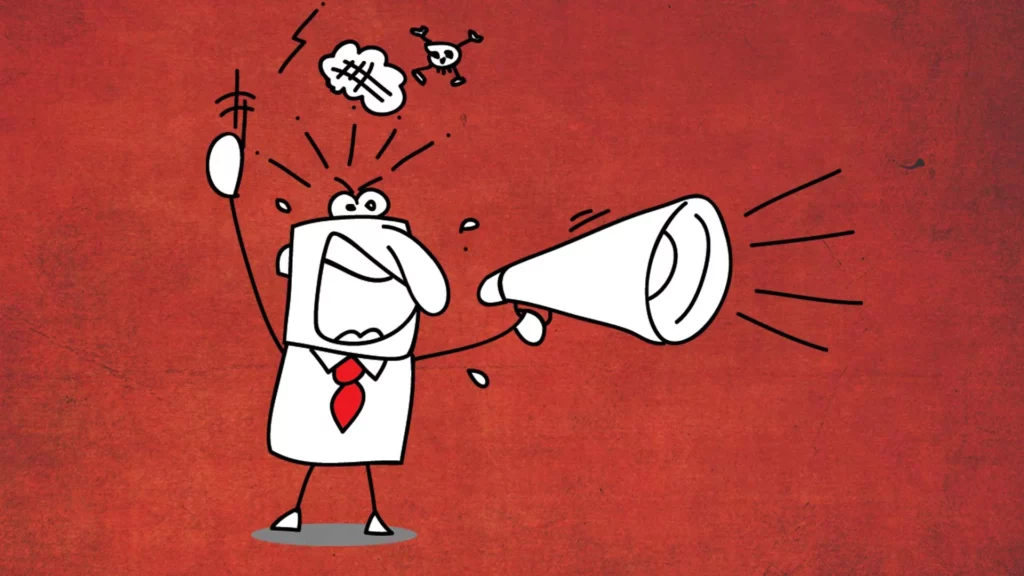Do you ever feel like you’re just holding in all your anger? Like if you let it out, things would get really bad and you’re one wrong comment away from boiling over? Well, you’re not alone. In fact, a lot of people suppress their anger. And while it might seem like a good idea at the time, there are actually some pretty big risks associated with this type of behavior. In this blog post, we will discuss the hidden danger of suppressed anger and how to deal with it in a healthy way!
Contents
What Is Suppressed Anger?
 We are all familiar with the feeling of anger. It is a normal and healthy emotion that everyone experiences from time to time. However, when we bottle up our anger and don’t allow ourselves to express it in a healthy way, this is when problems can arise. Suppressed anger is when we hold in our anger instead of expressing it in a constructive manner.
We are all familiar with the feeling of anger. It is a normal and healthy emotion that everyone experiences from time to time. However, when we bottle up our anger and don’t allow ourselves to express it in a healthy way, this is when problems can arise. Suppressed anger is when we hold in our anger instead of expressing it in a constructive manner.
Anger is mostly portrayed as a negative emotion and while it can certainly lead to some destructive behavior, it is important to remember that anger is not inherently bad. In fact, anger can be a very powerful motivator for change. The key is to express your anger in a healthy way.
The reality of the situation is that most of us have been taught to suppress our anger. We’ve been told that it’s not polite to get mad, that we should just let things go, or that we’ll regret it if we say something in the heat of the moment. And while there is some truth to these statements, holding in our anger can actually do more harm than good.
How To Know If You Are Suppressing Anger?
Suppressing anger is mostly a subconscious occurrence. This means that you might not even realize that you are doing it! However, there are some telltale signs that you can look out for. If you
- Finding yourself getting irritable or snappy over small things
- Avoiding conflict or confrontation
- Overuse of sarcasm or cynicism
- Having difficulty setting boundaries
- Feeling guilty, ashamed, or bad when you are angry
- Having a lot of physical tension
- Becoming defensive when accused of being angry
- Bottling up your feelings and then later explode over something minor
- Regularly saying things like “I’m fine,” “I’m not mad,” or “It’s no big deal,” when you are actually feeling angry
- Tendency to be passive aggressive
- Having a hard time expressing how you’re feeling
- Holding in your anger until it turns into resentment
- Engaging in self-destructive behaviors like drinking, overeating, or drug use
If you retrospect to find any of these qualities in yourself or someone around you, it is likely that you are suppressing your anger. And while it might not seem like a big deal, the truth is that suppressed anger can have some serious consequences.
Why Do People Suppress Their Anger?
 The reasons behind why someone might suppress their anger are varied. It can range from psychological, social, and even religious reasons.
The reasons behind why someone might suppress their anger are varied. It can range from psychological, social, and even religious reasons.
- In many cases, people have been taught from a young age that anger is bad or wrong. This could be due to messages they received from family, friends, or even the media.
- In other cases, people might suppress their anger because they are afraid of conflict or confrontation. They might think that if they express their anger, it will make the situation worse or they will hurt the other person’s feelings.
- Invalidation and criticism towards anger can also play a role in why people might bottle up their emotions. If someone is regularly told that their anger is wrong or they are told to “just calm down,” this can lead to them feeling like they need to suppress their anger.
- People with low self-esteem might also be more likely to suppress their anger. They might think that they don’t have a right to be angry or that their anger is not valid.
- Moreover, some people have a fear of authority. So, even when they are angry about something, they might not express it because they don’t want to get in trouble.
- Some people might also suppress their anger because they think it is not a “spiritual” emotion and that they should be above such things.
These are only a few of the reasons why someone might suppress their anger. It’s important to remember that there is no one right or wrong reason to do so. Whatever the reason may be, it is important to understand that suppressed anger is not healthy and can have some serious consequences.
How Does It Impact Life?
When we have a lot of suppressed anger, we tend to think that keeping it in will magically make it disappear. But that’s not how anger works. Instead, holding in our anger can actually lead to a number of problems both physically and mentally.
The physical impacts include:
- High blood pressure
- Heart disease
- Stroke
- Sleep problems
- Appetite and weight fluctuation
- Skin/hair loss
- Fatigue
- Digestive problems
- Headaches and migraines
The mental impacts of suppressed anger can be just as serious and include:
- Anxiety
- Depression
- Insomnia
- Bipolar disorder
- Personality changes
- Obsessive-compulsive disorder
- Anger outbursts or aggression
- Self-destructive behaviors
- Relationship problems
- Substance abuse
Additionally, there are various domains of life that can be affected by suppressed anger. These include work, school, and social life. It is important to note that not everyone who suppresses their anger will experience all of these impacts. However, it is still important to be aware of the potential consequences of bottling up emotions.
As you can see, the consequences of suppressed anger are far from harmless. In fact, they can be quite serious and even life-threatening. That’s why it’s so important to find healthy ways to express your anger.
How To Manage It?
 Fortunately, there is an array of options available for managing and expressing anger in a healthy way.
Fortunately, there is an array of options available for managing and expressing anger in a healthy way.
Some people might find that attending therapy or counseling can be helpful. This is because it provides a safe space to explore the root causes of anger and develop healthy coping mechanisms. The various types of therapy types that can be helpful include:
- Cognitive-behavioral therapy
- Dialectical behavior therapy
- Interpersonal therapy
- Clinical hypnosis
- Psychotherapy
- Expressive art therapy
- Support groups
Others might find relief through medication, especially if there is an underlying mental health condition that is contributing to the anger. Medications work by altering brain chemistry and can be helpful in managing symptoms. Some of the most common medications used to treat anger include:
- Antidepressants
- Anti-anxiety medication
- Mood stabilizers
- Beta-blockers (to help with physical symptoms)
However, it is important to note that medication should always be combined with some form of therapy. This is because medication alone is not enough to address the root causes of anger.
There are also some lifestyle changes that can be helpful in managing anger. Some of these include:
- Exercise
- Yoga
- Meditation
- Deep breathing exercises
- Progressive muscle relaxation
- Mindfulness training
- Spending time in nature
- Getting adequate sleep
- Eating a healthy diet
- Avoiding alcohol and drugs
The bottom line is that suppressed anger is not something to be taken lightly. It can have serious consequences for both your physical and mental health. If you find that you are struggling to manage your anger, please reach out for help. There are people who care and want to see you succeed.
Conclusion
To draw a conclusion of the above, it is evident that suppressed anger can lead to some serious consequences. However, there are also various methods which can help to manage and express anger in a healthy way. If you find yourself struggling to control your anger, please reach out for help from a professional. Remember, you are not alone.
If you or someone you know is looking for psychological help, Therapy Mantra is here for you. We are the leading providers of online therapy and counseling. Our team of highly trained and experienced therapists can provide assistance at the most affordable rates. Contact us today to learn more about our services. You may also visit our website to book an online therapy session or download our free Android or iOS app for more information.


